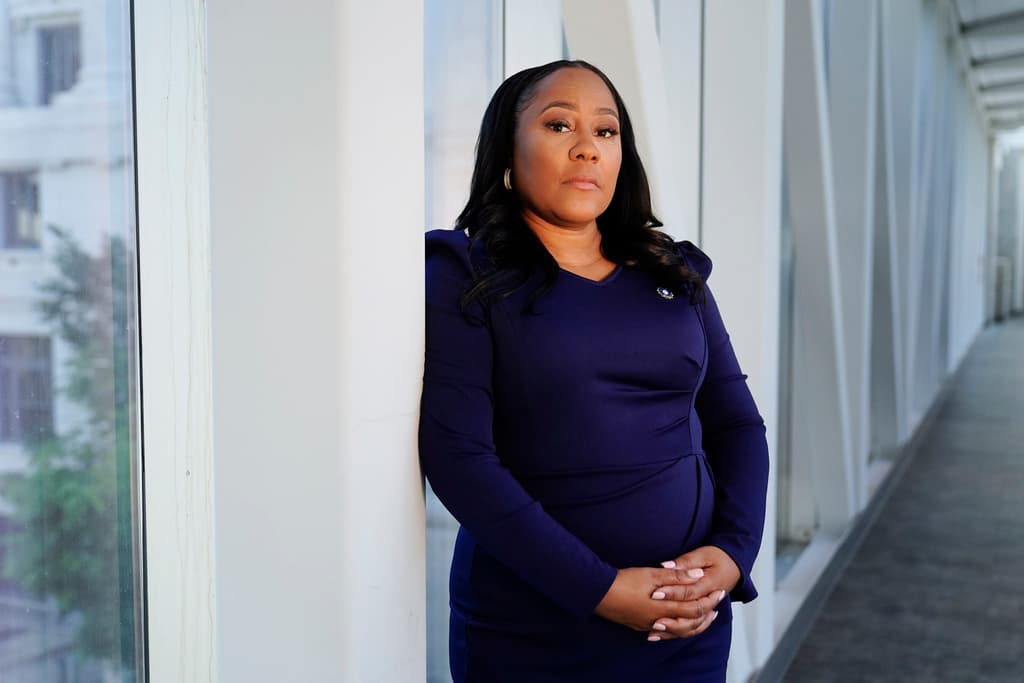New Focus on Divorce Records of Fani Willis’s ‘Boyfriend’ as Trump Co-Defendant Seeks To Have Her Removed From the Case
The prosecutor now faces a subpoena related to the divorce of her handpicked special prosecutor and alleged paramour.

The district attorney of Fulton County, Fani Willis, is accustomed to issuing subpoenas, not receiving them. Now, though, comes a role reversal that could imperil her sprawling criminal case against President Trump and more than a dozen others.
The document summons Ms. Willis to testify in the divorce case between her handpicked prosecutor — and possible paramour — Nathan Wade and his wife, Joycelyn. Those proceedings, initiated in 2021, have been under seal since 2022. The Wall Street Journal first reported the existence of the subpoena.
Now, the fortunes of the criminal case against Mr. Trump appear to be tied to how much of an extramarital romance can be excavated, and whether the often secretive world of divorce proceedings can be pierced to a sufficient extent to surface a tale of favoritism on the part of Ms. Willis that could be not only illicit, but possibly illegal.
Ms. Willis’s personal relationship with Mr. Wade has come under scrutiny because of its professional dimension. Eschewing the attorneys in her own office, she tapped Mr. Wade — who has never tried a felony case before — to lead the prosecution of the 45th president and his camarilla. Mr. Wade has thus far raked in $654,000 for his services.
That number, and the accusation that Mr. Wade is unqualified to try this case, come in a motion filed by one of the Georgia defendants, Michael Roman. He alleges that Ms. Willis’s relationship with Mr. Wade renders her indictment “defective” and demands their disqualifications from the case. The district attorney promises to respond “through appropriate court filings.”
Mr. Roman is charged with seven felonies, including conspiracies to commit forgery and impersonate a public officer. In his bid to have those charges dismissed as brought in violation of prosecutorial ethics and professional standards, he asks why “a private citizen such as the special prosecutor” — that’s Mr. Wade — would “shield filings related to his income and spending from public view?”
In the absence of those hidden documents, Mr. Roman relies on “information obtained outside of court filings” and “sources close to both the special prosecutor and the district attorney.” He claims that this anonymous trove confirms a personal romantic relationship that “began before this prosecution was initiated and before the district attorney appointed the special prosecutor.”
While Mr. Roman acknowledges that Mr. Wade’s divorce proceedings are locked pursuant to a court order, he adds that the legality of that ruling is “open to question,” telegraphing that he is poised to challenge the sealing of the divorce case. The default in Georgia is that divorce proceedings are public. If an individual wants them sealed, he or she must make that request of a judge.
When Georgia judges decide whether to seal divorce records, they employ a balancing test, weighing the harm inflicted to the privacy of the parties against the presumption that the public has an interest in knowing the details of the separation. Georgia’s court records website explains that requests for sealing “are only likely to be granted if the parties submitting these requests can demonstrate that actual harm resulted from putting the information in the public domain.”
A family law attorney in Georgia, William Claiborne, tells the Sun that while it is “unusual to have records sealed,” such a step is not in and of itself “prima facie a sign of nefariousness.” Reflecting on his own experience, he sees “judicial discretion” as the only rule of the road when it comes to predicting whether a court will decide to seal.
What is public, though, is that Ms. Willis appointed Mr. Wade as special prosecutor one day before he filed for divorce. That would suggest that their alleged relationship — Mr. Roman describes cruises, island getaways, and “cohabitation” — transpired while Mr. Wade was legally married, and before he started work on this case. Mr. Roman also contends that Ms. Willis never secured the approval of Fulton County for his appointment, as required by law.
Mr. Roman’s allegation that Mr. Wade is taking “Ms. Willis on, and paying for vacations across the world with money he is being paid by the Fulton County taxpayers” could be of interest not only to the cadre of Ms. Willis’s defendants, but also to Ms. Wade. Adultery is a misdemeanor crime in Georgia, though it has not been charged in a century, and is likely unconstitutional after the Supreme Court’s ruling in Lawrence v. Texas.
Mr. Claiborne tells the Sun that adultery — of the kind Mr. Roman accuses Ms. Willis of carrying on with Mr. Wade — can shape the contours of a divorce settlement. He explains that if a party causes the breakup of marriage through an extramarital affair, that party can’t receive alimony. He adds that the “conduct of parties in marriage is a factor” in the distribution of property.
The longtime lawyer, though, demurred when asked if the allegations against Ms. Willis were of the kind that could sink not only a marriage, but a case.

